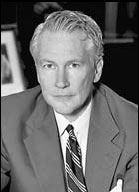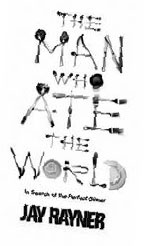Reviews
Books
The war on terror

George Bush's claim that we are involved in a war against terror has been widely ridiculed. At best, it was a politician's rhetorical flourish like the war against poverty or the war against drugs; at worst, it was a cynical device to justify interventionist wars overseas and encroachments on civil liberties at home.
Philip Bobbitt (pictured) devotes more than 600 pages in Terror and Consent: The Wars for the Twenty-first Century to arguing that the concept of a war against terror is historically, legally, politically and morally correct. His style is academically merciless: He starts by demolishing, in turn, 22 popular fallacies perpetrated by those who do not believe we are at war.
But this is an important book by an influential American strategic thinker and must be taken seriously. His defence of the most famous Bushism contrasts with his evident contempt for the Bush administration itself, and his views bear a striking similarity to those of the man who may well be the next US president, John McCain.
His central argument is that the war against terror (starting with the one against al-Qaida) is fundamentally different in character from earlier manifestations of terrorism: from the Jewish rebels against the Romans, Indian thuggees, and pirates of the Caribbean through to the Jacobins, the IRA and the PLO.
The differences are two. One is that the new terrorism centers on the acquisition and eventual, deliberate, use of weapons of mass destruction to generate mass terror; 9/11 was, on this view, merely an hors d'oeuvre for a bigger meal to come.
His second big idea is that modern terrorist organizations are a natural response to the end of the era of the nation state. The new terrorist groups, such as al-Qaida, mimic and are a product of the decentralized, outsourcing, privatized, globalized, networked world of what he calls the new market state.
Market states are wealthier and offer more opportunities than traditional nation states. But they are more vulnerable, and part of their vulnerability lies in the "commodification" of and trade in weapons of mass destruction.
The new terrorist groups know their enemy. They have no interest in national identity or territory; they have a "global" ideology; and their aim is to disable the market state by causing mass death and creating terror among civilian populations.
The war on terror was a concept first proclaimed by a president who will be remembered for incompetence and intellectual laziness. We shouldn't assume, however, that it will disappear with him. Better presidents, Republican and Democrat, may well adopt it. If so, this book is the place to discover what the war on terror actually means.
Meaningless pursuit

In writing The Man Who Ate the World: In Search of the Perfect Dinner, Jay Rayner found himself in much the same dilemma as he travelled five continents in search of his perfect dinner. In fact, his dilemmas are multiple. His project was the globalization of the restaurant business: How Gordon Ramsay is no longer content with kitchens in London, but must open in Dubai, Tokyo, New York and Paris; how the super-rich have provoked a diaspora of chefs that follow the money wherever it leads.
It is not easy to wax lyrical about the vulgarity and bad taste of Las Vegas, Moscow or Dubai; the repetition of high-end ingredients such as truffles, foie gras and lobster in rich men's dinners is dispiriting in the extreme; the ludicrous prices thought reasonable by some are enough to turn one Trappist overnight; and reporting on these excesses does few of us, Rayner included, any good.
It is encouraging that our author starts having doubts before his journey's over, though he could have worked that out before catching the tube to Heathrow. Indeed, by the finish it looks as if he might throw in the towel altogether and start reporting something useful and uplifting. The Guardian
(China Daily 06/03/2008 page20)














